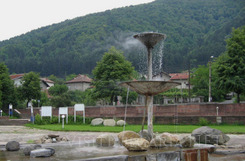Over one billion euro has been invested in the wellness and spa industry in Bulgaria over the past more...
| Search | Hotels / Accommodation | Vacations | Tours & Trips | Rent A Car | Transport | Flights | Conferences | Press Centre | Yachting |
- Holidays in Bulgaria
- All inclusive
- Beach
- Birdwatching
- Golf
- Health
- History
- Hunting
- Monasteries/ Religious
- Mountain biking
- Prom
- Rural
- Ski
- Spa & Wellness
- Trekking
- Water sports
- Weekend breaks
- Wine
- Conference
- Children Holidays
- Yachting
- Events
- Type of accommodation
- Hotels
- Apartments
- Villas
- Rural houses
- Destinations
- Aheloy
- Ahtopol
- Albena
- Apriltsi
- Arbanassi
- Asparuhovo
- Assenovgrad
- Bachkovo Monastery
- Balchik
- Bankya
- Bansko
- Banya (Karlovo)
- Banya (Razlog)
- Batak
- Beklemeto
- Belchin Bani
- Beli Iskar
- Belogradchik
- Berkovitsa
- Blagoevgrad
- Bodrost
- Bojichen
- Borovets
- Botevgrad
- Bourgas
- Bozhentsi
- Bratsigovo
- Brestovitsa
- Buzludja
- Byala
- Chepelare
- Cherepish Monastery
- Chernomorets
- Chiflik
- Devin
- Dimitrovgrad
- Dobarsko
- Dobrich
- Dobrinishte
- Dolna Banya
- Dospat
- Dryanovo
- Dupnitsa
- Dyuni
- Elena
- Elenite
- Elhovo
- Gabrovo
- Gela
- Golden Sands
- Gorna Oryahovitsa
- Gotse Delchev
- Govedartsi
- Grand Hotel Varna
- Harmanli
- Haskovo
- Haskovo Mineral Baths
- Hissarya
- Ivaylovgrad
- Kalofer
- Kamchia
- Kamen Bryag
- Kardjali
- Karlovo
- Kavarna
- Kazanlak
- Kiten
- Kom
- Koprivshtitsa
- Kosharitsa
- Kostenets
- Kostenkovtsi
- Kotel
- Kovatchevitsa
- Kranevo
- Kresna
- Kulinoto
- Kyustendil
- Lom
- Lovech
- Lozenets
- Lukovit
- Lyaskovets
- Madara
- Malko Tarnovo
- Malyovitsa
- Melnik
- Mezdra
- Momchilovtsi
- Montana
- Narechen Baths
- Near Golden Sands
- Nessebar
- Obzor
- Ognyanovo
- Osogovo
- Pamporovo
- Panagyurishte
- Panichishte
- Parshevitsa
- Pavel Banya
- Pavlikeni
- Pazardjik
- Pernik
- Petrich
- Pirdop
- Pleven
- Pliska
- Plovdiv
- Pomorie
- Pravets
- Preslav
- Primorsko
- Ravda
- Razgrad
- Razlog
- Ribaritsa
- Rila Monastery
- Riviera
- Rousse
- Rusalka
- Samokov
- Sandanski
- Sapareva Banya
- Semkovo
- Sevlievo
- Shabla
- Shipka
- Shipkovo
- Shiroka Laka
- Shkorpilovtsi
- Shoumen
- Silistra
- Sinemorets
- Sliven
- Smolyan
- Sofia
- Sopot
- Sozopol
- Srebarna
- St. Constantine & Elena
- Stara Zagora
- Starozagorski Baths
- Sunny Beach
- Sunny Day
- Sveti Vlas
- Svilengrad
- Svishtov
- Targovishte
- Teteven
- Tran
- Trigrad
- Troyan
- Tryavna
- Tsarevo
- Tsigov Chark
- Uzana
- Varna
- Varshets
- Veliko Tarnovo
- Velingrad
- Vidin
- Vitosha
- Voneshta Voda
- Vratsa
- Vratsata Gorge
- Yagoda
- Yakoruda
- Yambol
- Zlatitsa
- Zlatograd
- Bulgaria Guide
- General information
- Bulgarian Monasteries
- SPA Bulgaria
- The Black sea
- History
- Geography
- Maps
- Weather
- Airports in Bulgaria
- Webcams
- Forums
- Mountains in Bulgaria
- The Balkan Mountain Range
- Rila Mountain
- Pirin Mountain
- The Rodope Mountain
- Vitosha Mountain
- Travel Arrangements
- Visit Bulgaria
- Visa Requierments
- Choose Destination
- Flights to Bulgaria
- Transport in Bulgaria
- Advice
- Currency
- Official Holidays
Subscribe to newsletters to receive our hottest offers:
Putting Тourists in Hot Water - FT
Financial Times, Theodor Troev

A warm mist floats over the thermal spring at Rupite, a shallow pool in a flower-filled park in southern Bulgaria. The spring has long been associated with Vanga, a 20th century spiritualist who claimed the area had a special energy that contributed to her powers of prophecy.
The spring, which bubbles up at a temperature of 76 degrees Celsius, forms the crater of an extinct volcano, and is one of some 900 mineral water sources that could turn Bulgaria into a popular destination for health and wellness tourism.
"In Europe we are second only to Iceland in thermal springs, and over 90 per cent of them have healing properties," says Stanislav Novakov, deputy chairman of the State Agency for Tourism. "At present we use just 5 to 6 per cent of our mineral water resources."
The healing properties of Bulgaria's thermal springs were known some 2,500 years ago to the ancient Thracians, who worshipped running water and built "nymphaeums," sanctuaries for healing rituals.
The Romans followed suit by building "asklepions," where the curative properties of thermal springs restored the health of emperors and their legionaries. Under Ottoman rule the tradition continued with elaborate lead-domed bath-houses built over hot mineral springs.
Bulgaria's current tourism strategy aims at diversifying away from both ski resorts and the sun-and-sand destinations of the Black Sea coast. Mr Novakov says: "We're focusing on spa and wellness tourism, combined with golf."
Land prices have soared around half-a-dozen spa resorts that were developed in the communist era as private investors position themselves in a new market segment.
"A private equity investor is going to be interested in not just a hotel but a spa destination," says George Velchev, executive vice-president of Sigma Capital, a UK-based investor in branded resorts in Bulgaria.
Current legislation on using thermal springs, which are owned by the state, allows a spa operator to bid for a concession of five to 15 years. Over-development at spa resorts is unlikely, developers claim, because the volume of water is limited.
Renetta Yankov of Rockarch Estates, a UK-based property consultancy, says interest in buying residential property at spa developments is growing "although this market is still at a very early stage in Bulgaria".
So far Sandanski in southern Bulgaria is the only spa resort that has seen significant recent development. Its springs have attracted visitors for centuries, from the ancient Thracian Medite tribe to Todor Zhivkov, Bulgaria's ruler under communism who built himself a spa residence on a hilltop site outside the town.
Set on the Struma river, Sandanski enjoys the mildest climate in Bulgaria and claims to be among the best places in Europe for treating bronchial asthma.
Andon Totev, the town's mayor, who managed the main spa hotel under communism, says more than 70 per cent of visitors are foreign.
Scandinavians come every year for treatments lasting several weeks, while Greeks, Macedonians and Serbs drive across the border to spend a weekend taking the waters.
"We have the potential to become one of Europe's best-known spa and wellness resorts," Mr Totev says.
Sandanski's first five-star spa hotel, Pirin Park Hotel, set in a forested valley above the town, is set to open this month, offering both wellness facilities and supervised medical treatments. The complex also includes residential apartments being marketed abroad.
"This is a place with an exceptional mix of curative mineral water, a well conserved natural environment and a wealth of cultural sites," says Siyka Katsarova, commercial manager for Royal Holiday, a Bulgarian company that developed the complex.
Arben Karadza, a partner in Sandanski Properties, moved to the town from Kosovo so his mother could treat a chronic asthma problem. He has diversified from trading to property development, acquiring land for building spa and wellness complexes combining a hotel with residential properties.
His company will manage the properties, giving owners a guaranteed income and four weeks' access annually to their apartment, including free treatments at the spa and wellness center.
"This arrangement is suitable for a spa development, which should attract a high percentage of returning clients," he says.
The spa centre at his first hotel, Medite Spa Resort, set on a hillside above the town, is discreetly located below the tennis courts. As well as a mineral water swimming pool, where the temperature has been reduced from 80 degrees Celsius to that of the Mediterranean on a hot day, the centre offers a variety of treatments, including a grape extract massage that recalls the wine healing treatments of the ancient Thracians.

















